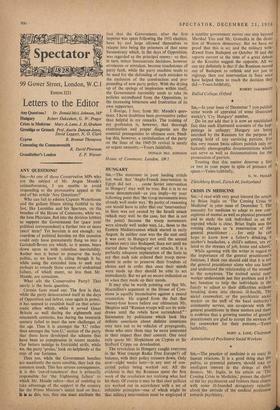CRISIS IN MEDICINE
SIR,-1 read with very great interest the article by Brian Inglis on 'The Coming Crisis ill Medicine' in your issue of December 7. The necessity for medicine to adapt to new con ccptions of mental as well as physical processes and to study the sick individual as an in tegrated whole is clear. Brian Inglis sees the coming changes as 'a resurrection of the
general practitioner . for only he can hope to know how a father's drinking, a mother's headaches, a child's asthma, are re lated to the stresses of job, home and school.
While agreeing with the writer in regard to the. importance of the general practitioner's function, I think one should add that it is not the general practitioner alone who can knout and understand the relationship of the stresses to the symptoms. The trained social case worker understands just this problem and it i9 her function to help the individuals in the family to adjust to their difficulties without breaking down into chronic ill-health. The social caseworker, or the psychiatric social worker on the staff of the local authority's community service, can co-operate with the general practitioner in these matters and there is evidence that a growing number of general practitioners are glad to accept the services of the caseworker for their patients.—Yours faithfully, MARY A. LANE, Chairman
Association of Psychiatric Social Workers


































 Previous page
Previous page